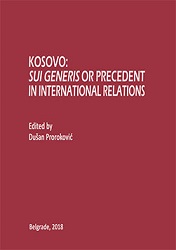LegaL and poLiticaL aspects of the Kosovo’s uniLateraL decLaration of independence
LegaL and poLiticaL aspects of the Kosovo’s uniLateraL decLaration of independence
Author(s): Peter Terem, Peter Rosputinský
Subject(s): Law, Constitution, Jurisprudence, International Law, Human Rights and Humanitarian Law
Published by: Институт за међународну политику и привреду
Keywords: Declaration of Independence; Statehood; International Law; Precedent; Sui generis;
Summary/Abstract: Kosovo declared independence ten years ago. Theorists and representatives of the states still react inconsistently to this act. This is not only proved by Kosovo’s international recognition but also mostly by the fact that Kosovo was not included into the family of nations in form of full membership in international organizations. During these ten years, there were some serious efforts to gain independence, at least in Catalonia, Kurdistan and Scotland. Despite the fact that in these parts of the world Kosovo’s case is well-known, it is not used as an argument in attempts of their statehood. Situations where we may find parallels with Kosovo are two secessions from Georgia. The international community condemned and criticised all these unilateral actions with the aim to create a new state without the consent of territorial sovereignty. Provided that the prevailing position of states towards these cases corresponds to international law, is Kosovo really a precedent? In other words, why is Kosovo’s statehood relative widely accepted, if similar cases are convicted as illegitimate and unlawful? Is this because Kosovo is a sui generis? Strictly speaking, every case in international relations is unique. Subsequently, isn’t it correct to consistently apply the same international legal framework to all cases around the world?
Book: KOSOVO : sui generis or precedent in international relations
- Page Range: 91-107
- Page Count: 17
- Publication Year: 2018
- Language: English
- Content File-PDF

